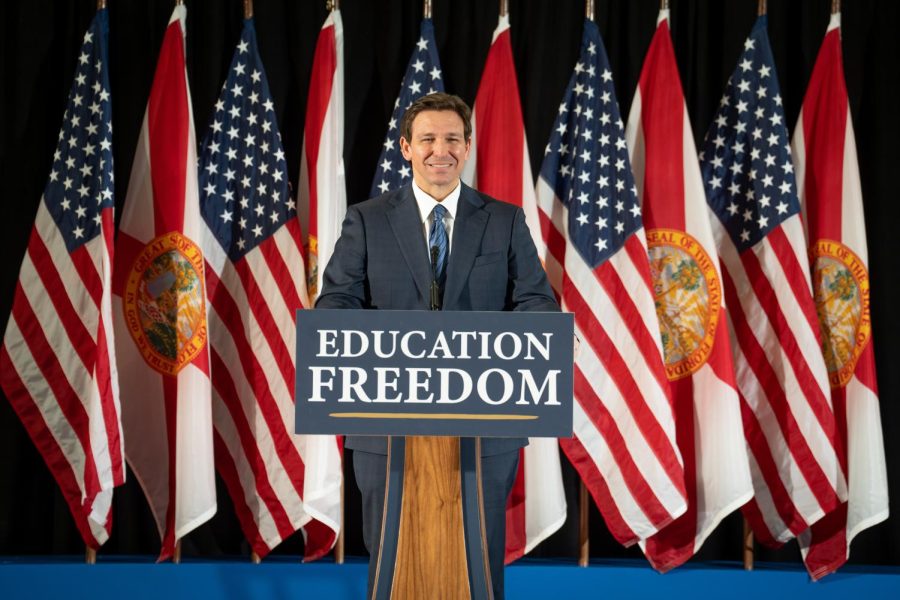Big Changes for Florida K-12 & College Education
May 22, 2023
Florida’s legislature passed controversial bills in the past two weeks that will have a number of impacts on both K-12 and higher education in Florida. The legislation restricts students’ access to lessons about race and racism, sexual orientation, and gender identity in the classroom.
Gov. Ron DeSantis has signed multiple bills that critics say expand his “Don’t Say Gay” bill, taking aim at discussions about gender identity and sexual orientation in the classroom. The expansion of the bill allows parents to sue school districts over violations of the bill’s terms. It runs the risk of educators having their licenses revoked in the event that they violate the ban.
The expansion of the “Don’t Say Gay” Bill was proposed by Republican Gov. Ron DeSantis’ administration last month and approved on Wednesday. The legislation states that all public school students will be banned from learning about these topics, unless required by existing state standards or as part of reproductive health instruction that students can opt out of.
The bill has received widespread backlash from across the United States. Students demonstrated against the act throughout Florida by holding walkouts across middle and high schools. Lawsuits have also been filed against the act with the support of advocacy groups representing parents and families of LGBT+ children; numerous other advocacy groups have also issued statements opposing the act.
Other legislation has expanded beyond K-12 education and to college education through the removal of college majors and minors on gender studies and critical race theory, among other similar disciplines such as the removal of state funding for college diversity, equity, and inclusion programs.
On Monday, May 15th, Gov. DeSantis signed three bills that will bring major changes to Florida’s colleges and universities. The legislation was signed by DeSantis at New College of Florida while students of the university protested nearby. A New College board revamped by DeSantis abolished the school’s DEI office, and the college’s interim president recently fired the diversity dean, a precursor to what other Florida universities could experience under SB 266.
The legislation banned state funding for diversity, equity and inclusion (DEI) programs at Florida’s public universities and restricts how gender and race are taught on campus. It requires university officials to review any lessons “based on theories that systemic racism, sexism and privilege are inherent in the institutions of the United States and were created to maintain social, political and economic inequities.” Florida’s new law joins legislation in 19 other states where lawmakers have targeted diversity, equity and inclusion (DEI) programs, according to a tracking project from the Chronicle of Higher Education.
Under the new law, Florida’s public colleges are prohibited from spending state or federal money on DEI efforts. These programs often assist colleges in increasing student and faculty diversity, which can apply to race and ethnicity, as well as sexual orientation, religion and socioeconomic status. The bill does not prohibit colleges from spending money on such programs if they are required by federal law.
DeSantis has said that eliminating diversity, equity, and inclusion programs and offices cost $34 million across the state’s college and university system; the legislation allows each university’s Board of Trustees to order a tenure review of professors at any time.
The law also forbids public colleges from offering general education courses that “distort significant historical events,” teach “identity politics,” or are “based on theories that systemic racism, sexism, oppression, or privilege are inherent in the institutions of the United States and were created to maintain social, political, or economic inequities.” Despite the fact that these courses are part of the required curriculum for all college students, they will no longer be offered.
HB 999 would prohibit colleges from funding DEI. The bill bans courses “based on unproven, theoretical, or exploratory content,” leading critics to ask if that includes the theories explaining evolution, gravity, theoretical physics. Gender studies, critical race theory, and intersectionality would also all be prohibited from being taught as majors. The bill additionally recommends the rewriting of universities’ mission statements. Prior to amendments suggested in early April 2023, women’s history and women’s studies would also be among the affected disciplines.
Among the recently passed legislation is House Bill 1259, which was passed by the Florida House to change the allocation of state funds to charter schools and school districts. Under the bill, tax revenue collected through discretionary 1.5-mill local levies will be allocated in proportion to the enrollment of charter schools relative to that of the districts. These funds are permitted to be used towards the procurement of land and the construction of facilities, among other expenditures.
The purpose behind this bill is to fund all Florida students equally. Historically, charter schools have received less per student than public schools.
Beginning in Fiscal Year (FY) 2023-24 school districts will be required to share a portion of 20 percent of accrued revenue funds, a portion of 40 percent in FY 24-25, a portion of 60 percent in FY 25-26; a portion of 80 percent in FY 26-27, and a portion of 100 percent beginning in FY 27-28.








